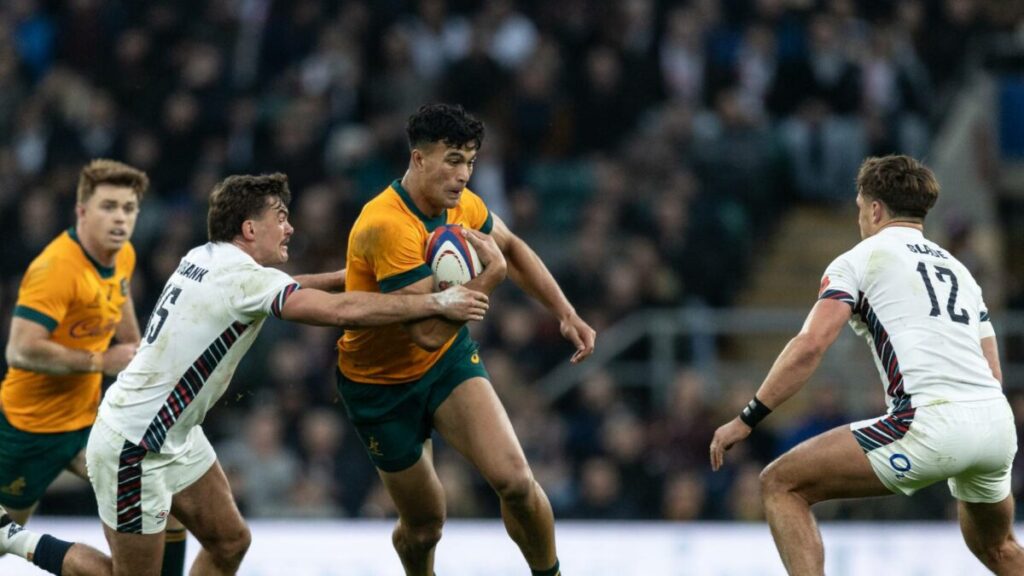It’s been well over half-a-century since a Wallabies coach handed out as many caps in a calendar year as Joe Schmidt has done in 2024, but the New Zealander isn’t sweating like he might once have.
On Sunday morning (2:10am AEDT), Waratahs playmaker Tane Edmed is poised to become the 19th Wallabies debutant in five months should he come off the bench against Ireland at the Aviva Stadium in Dublin.
It’s the most debutants in a single year since Eddie Jones handed 14 players their first caps in 2005, while 13 was the most Dave Rennie, Michael Cheika and Robbie Deans capped in a single year during their tenures as Wallabies coach.
You have to go back to 1958, when 23 Wallabies made their debuts during the world tour of Britain, Ireland, France and Canada on which they played five Tests and thirty-one minor tour matches, before later playing in New Zealand, to have a season where more caps were handed out than Schmidt’s first season in charge.
Although it’s likely more than Schmidt would have envisioned, the New Zealander points to his time at Leinster, one of the most successful clubs in Europe since Michael Cheika turned it around and led them to the Heineken Cup in 2009, as one of the reasons why building a bigger base can ultimately prove advantageous.
“He [Edmed] will be our 19th debutant for the season, which is an attempt to grow that player pool,” Schmidt told reporters at his final Wallabies team announcement.
“I think one of the things that I learned in Leinster is that in my first year, I was so bitter. They [the Irish national side] take half your players.
Joe Schmidt has handed 19 players their first Wallabies caps in 2024 – the most since 1958. (Photo by David Davies/PA Images via Getty Images)
“But then you found kids like Jordi Murphy and these young men that were just so keen to get through and get involved.
“Sean O’Brien gets taken for Ireland, and suddenly Josh van der Flier gets a start. Five years on, Josh van der Flier is at the top of his game. Unfortunately, eight years on, he’s still at the top of his game, and I’m on the other side.
“Those are the opportunities that emerge.
“I just think with the Wallabies, we wanted to try to really grow the group this year. Galvanise the group as well, so that we can be as competitive as we can next season.”
The other factor likely leading to the record number since the game turned professional in the mid-1990s is unlike in his previous two national coaching jobs, with Ireland and then the All Blacks, where he was first a selector and then an assistant coach, Schmidt hadn’t worked with an Australian Super Rugby side before taking on the Wallabies head coaching job.
It meant he didn’t know the pool of talent he was working with in Australia like he did in Ireland.
“I also know that I’ve seen these players player, but I don’t know who they are, and I reckon getting to know who they are is as important as how they play,” Schmidt said at his maiden press conference.
“That’s part of the investment over the next three, four, five months, and getting some people alongside me who are really invested in a similar way to try and get the best out of them.”
Nor has Schmidt plucked players out of thin air, with the majority of the 19 fresh faces entering the Test arena with years under their belt.
The ones who haven’t – Max Jorgensen, Tom Lynagh, Darby Lancaster – are considered excellent long-term players, who already have shown an ability to perform at the top.

Joe Schmidt says the Wallabies are “keeping our head above water” after a rebuilding year. (Photo by Hagen Hopkins/Getty Images)
Another factor in helping the Wallabies appear a settled group despite the 19 debutants is Schmidt hasn’t chopped and changed in some of the core positions like hooker {Matt Faessler], halfback [Jake Gordon], fly-half [Noah Lolesio, outside centre [Len Ikitau] and fullback [Tom Wright].
It’s a stark contrast to his predecessors Eddie Jones, Dave Rennie and Michael Cheika (in his final year), who couldn’t settle on their preferred candidates at hooker, halfback, fly-half and fullback because of either form or fitness.
So how does Schmidt feel about his year’s work as he approaches his season finale in Dublin?
“I feel like I’m paddling hard, but I’m not necessarily going forward,” Schmidt said. “But I think we’re keeping our head above water.
“We’ve demonstrated we can be competitive with some really top teams … We have slipped off in a couple of second halves, which is frustrating, but at the same time, we’re trying to build to 80-minute performances and we’re trying to build depth so that if we get a ripple like we did last week, that we can still try to stay on top of the water.
“So, yeah, I wouldn’t say flying through it, but we are managing to keep our head above it, I think. And so there’s been progress, I believe.
“We were quite confident in the progress we were making, but sometimes when it’s not reflected on scoreboard results, there’s always an element of frustration.”
© AAP

